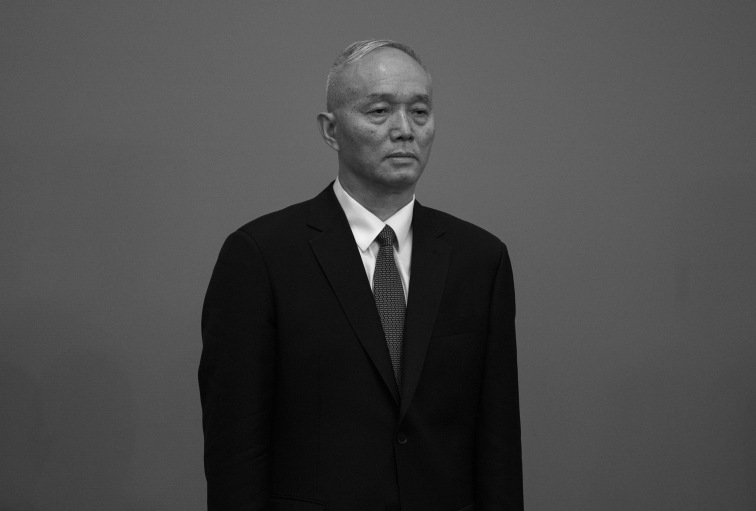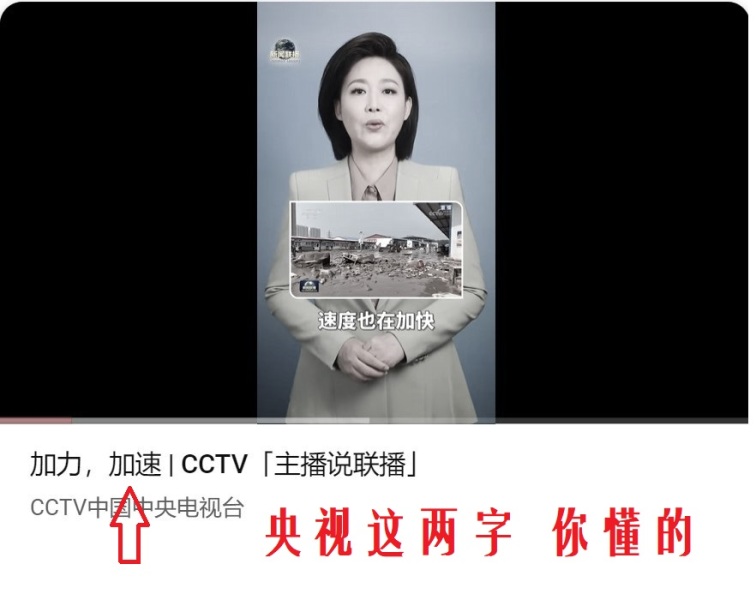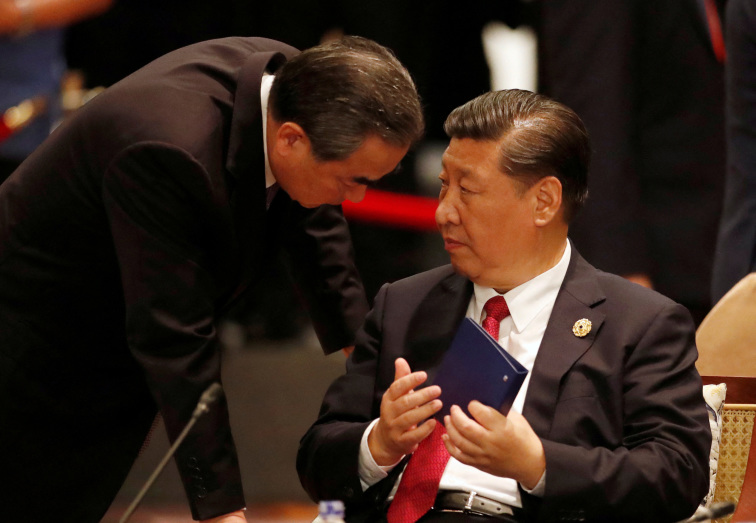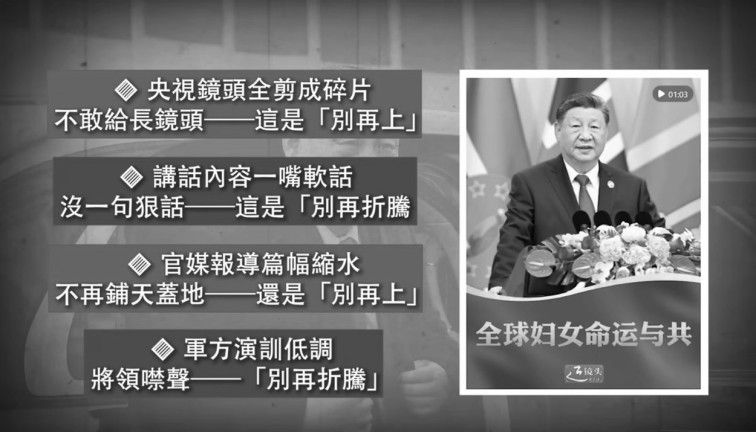On March 4, 2025, He Weidong attended the Chinese People&9;s Political Consultative Conference. (Photo credit: Pedro Pardo/AFP via Getty Images)
[People News] On October 17, just before the Chinese Communist Party’s (CCP) 20th Central Committee’s Fourth Plenary Session, Ministry of National Defense spokesman Zhang Xiaogang announced: CCP Politburo member and Vice Chairman of the Central Military Commission (CMC) He Weidong and eight others are suspected of serious duty-related crimes involving “particularly huge sums.” They have been expelled from the Party and the military, and their suspected criminal cases have been transferred to the military procuratorate for prosecution.
The nine are: He Weidong, Politburo member and CMC Vice Chairman; Miao Hua, former CMC member and Director of the CMC Political Work Department; He Hongjun, former Executive Deputy Director of the CMC Political Work Department; Wang Xiubin, former Executive Deputy Director of the CMC Joint Operations Command Center; Lin Xiangyang, former Commander of the Eastern Theater Command; Qin Shutong, former Political Commissar of the Army; Yuan Huazhi, former Political Commissar of the Navy; Wang Houbin, former Commander of the Rocket Force; and Wang Chunning, former Commander of the People’s Armed Police.
Among them, eight Central Committee members—He Weidong, Miao Hua, He Hongjun, Wang Xiubin, Lin Xiangyang, Qin Shutong, Yuan Huazhi, and Wang Chunning—were expelled from the Party. Their expulsions will be ratified at the full meeting of the Fourth Plenum.
All nine held the rank of general (shangjiang). Their general ranks should all now be revoked. It is likely that the authorities deliberately avoided mentioning this point, as publicly declaring that nine generals have fallen simultaneously would be too shocking for the hundreds of millions of Chinese citizens and over two million military personnel.
So, who is the person most unwilling to see these nine generals fall at once? Xi Jinping himself.
Why?
Because they were all true pillars of Xi’s personal faction within the military—the “Xi Family Army.”
He Weidong was Xi’s most trusted military confidant, personally promoted by Xi in an exceptional, accelerated manner. Before the CCP’s 20th National Congress in 2022, He was not a Party Congress delegate, nor a member or alternate member of the 19th Central Committee, nor a member of the CMC—only Commander of the Eastern Theater Command. Yet Xi “personally decided” that He Weidong was the most outstanding senior general in the entire military, indispensable for major responsibility. Xi promoted him in one leap at the 20th Congress to Central Committee member, Politburo member, and CMC Vice Chairman—making him the third most powerful figure in the armed forces.
He Weidong rose like a rocket but fell like one too. Barely two years and five months after the 20th Congress, He has become a prisoner—the shortest-serving Politburo member and CMC Vice Chairman in the CCP’s 76-year history.
The one most humiliated by He Weidong’s downfall is not He himself—but Xi Jinping.
Back in the day, after Mao Zedong purged his first chosen successor Liu Shaoqi, he selected Lin Biao as the next one. The CCP’s Ninth Party Constitution described Lin as someone who had “always” upheld the great banner of Mao Zedong Thought and “most loyally and steadfastly” carried out and defended Mao’s line. Lin was Mao’s “close comrade-in-arms and successor.”
However, after Lin’s death in a plane crash in Mongolia’s Öndörkhaan on September 13, 1971, the person most devastated was not Lin, but Mao.
American columnist Patrick Buchanan wrote in The Washington Post in a commentary titled “The September 13 Incident and Chinese Politics”: “Lin Biao, who always held the Little Red Book and shouted ‘Long Live Mao,’ the successor personally chosen by Mao, the second man in the Party constitutionally designated—suddenly defected abroad… This in itself made it hard for people to accept that yesterday’s leader could overnight become a sinner through the ages. Such a dramatic reversal made it impossible for the Party’s propaganda organs to explain convincingly, and even ordinary citizens began questioning Mao’s choice of successor, leading to broad reflections on the entire legacy of this so-called great man.”
After the Lin Biao incident, Mao’s health rapidly deteriorated. He fell gravely ill and nearly died.
Similarly, He Weidong’s downfall is the harshest slap in Xi Jinping’s face.
Miao Hua was another key figure personally handpicked by Xi. After the previous Director of the CMC Political Work Department, Zhang Yang, was investigated for ties to Xu Caihou and Guo Boxiong, Xi carefully chose Miao to replace him. At the 19th Congress in 2017, Xi promoted Miao to CMC member. At the 20th Congress in 2022, Xi reappointed him as CMC member and Political Work Department Director.
From 2017 to 2024, Miao Hua was the chief architect of Xi’s policy of “building the military politically”—the “organization minister” of the entire army who decided senior promotions and supervised top commanders as the “political commissar of all political commissars.”
After the 20th Congress, He Weidong was dubbed “Xi’s No. 1 confidant in the military,” while Miao Hua was called “Xi’s No. 2 confidant.” Together, they were Xi’s left and right arms in the army.
Xi’s original plan was likely that once CMC First Vice Chairman Zhang Youxia retired, He Weidong would succeed him as First Vice Chairman, Miao Hua as Second Vice Chairman—both assisting Xi in commanding the military.
Now, with both arms broken, how could Xi not feel the pain?
He Hongjun also played a crucial role in Xi’s military layout.
On July 9, 2024, just before the Third Plenary Session of the 20th Central Committee, Xi held a special ceremony for He Hongjun alone, promoting him to general and appointing him as Executive Deputy Director of the CMC Political Work Department. He was also personally vetted by Xi as a 20th Central Committee member.
At the time, Xi’s plan was likely that once Miao Hua was promoted to Politburo member and CMC Second Vice Chairman, He Hongjun would replace him as Political Work Department Director.
Yet soon after Miao Hua’s downfall, He Hongjun—another of Xi’s handpicked “political army-building” aides—also fell. With both of Xi’s key lieutenants in his prized political apparatus gone, how can his “political army-building” continue? And where can Xi’s dignity go?
Wang Xiubin was another of Xi’s favored “military elites.”
Like He Weidong and Miao Hua, Wang came from Xi’s old power base—the 31st Group Army stationed in Fujian. He Weidong had served as its deputy commander, Miao Hua as political department director, and Wang Xiubin as deputy commander.
In October 2017, while serving as commander of the 80th Group Army, Wang was promoted by Xi to alternate member of the 19th Central Committee. Less than two years later, in April 2019, he became deputy commander and chief of staff of the Eastern Theater Command. Three years later, in June 2021, he was promoted to commander of the Southern Theater Command. Three years after that, in July 2024, he was transferred to Executive Deputy Director of the CMC Joint Operations Command Center. Wang’s sudden downfall shows Xi completely misjudged him.
Lin Xiangyang was one of Xi’s specially favored “younger-generation military leaders.”
He successively served as deputy commander of the 31st Group Army (Nanjing Military Region), commander of the 47th Group Army (Lanzhou Military Region), and commander of the 72nd Group Army (Eastern Theater). He is the only general in the PLA to have commanded three different group armies. He participated twice in Xi’s grand military parades—first in the September 3, 2015 Victory Parade, then in the 2017 National Day parade.
Lin was promoted from lieutenant general to general in just 14 months—a record for the fastest promotion to general in the PLA. After serving as Eastern Theater Army Commander for only one year and two months, he was elevated to Commander of the Central Theater Command, becoming the youngest theater commander at the time. Only half a year later, he replaced He Weidong as Commander of the Eastern Theater Command.
The Eastern Theater Command is Xi’s primary force for a potential military takeover of Taiwan. Xi originally expected Lin to play a major role in that plan. But before any Taiwan campaign could begin, Lin himself collapsed. For Xi, this must be “a bitter taste in his heart.”
Qin Shutong, like Miao Hua, also once served as political department director of the 31st Group Army. In April 2018, he was promoted to Director of the Army’s Political Work Department, and in January 2022, to Political Commissar of the Army with the rank of general—all under the supervision and recommendation of Miao Hua.
At that time, Xi regarded Miao as “the most trusted of the trusted.” Naturally, he favored Miao’s recommendation of Qin, expecting him to be Xi’s loyal “political overseer” beside the Army Commander. But when Miao fell, Qin fell too. To this, Xi could only “sigh long and wipe his tears.”
Yuan Huazhi was Miao Hua’s subordinate during Miao’s tenure as Navy Political Commissar. Xi promoted Yuan based on Miao’s recommendation. When Miao fell, Yuan fell as well. Xi could only lament: “Miao Hua has misled me!”
The fall of Rocket Force Commander Wang Houbin dealt Xi an even greater blow. Why?
Because the Rocket Force is Xi’s trump card—the key force he relies on for attacking Taiwan and confronting the United States. It controls strategic missiles capable of carrying conventional or nuclear warheads at short, medium, long, and intercontinental ranges, involving cutting-edge technologies in space, missiles, and nuclear weapons—the most technically sophisticated, powerful, and destructive branch of the PLA.
The first Rocket Force Commander personally promoted by Xi, Wei Fenghe; the second, Zhou Yaning; and the third, Li Yuchao—all fell due to serious corruption. Xi’s choices were wrong once, twice, three times. Now the fourth commander he selected, Wang Houbin, has also been exposed for serious corruption—Xi’s fourth error.
One mistake might be forgiven; two, understandable; three, a major blunder; four, an egregious catastrophe.
Before and after the 20th Party Congress, the CCP’s propaganda machinery whipped up a frenzy of personal worship around Xi, praising him to the skies. Yet less than three years later, Xi has stumbled four times in a row with the Rocket Force. Who would still dare to be loyal to him?
The fall of People’s Armed Police Commander Wang Chunning is also a huge blow to Xi.
After coming to power, Xi feared the Armed Police might be involved in coups. He therefore removed its dual control under the CMC and the State Council, placing it solely under the CMC’s command. He then purged its senior ranks—removing figures such as former Commander Wang Jianping and many other top generals from the Jiang Zemin era.
Now, Xi’s personally appointed and promoted Armed Police Commander Wang Chunning has also been found to be a serious corrupt official. Xi can only blame himself for poor judgment and misuse of personnel.
The simultaneous downfall of nine generals personally elevated by Xi marks the collapse of the “Xi Myth” fabricated by his propagandists over the past 13 years.
At the CCP’s 20th Congress in 2022, Xi probably never imagined that in less than three years, the core group of senior military officers he had handpicked and trusted most would topple like dominoes.
As the saying goes: Man proposes, but Heaven disposes.
— The Dajiyuan △











News magazine bootstrap themes!
I like this themes, fast loading and look profesional
Thank you Carlos!
You're welcome!
Please support me with give positive rating!
Yes Sure!